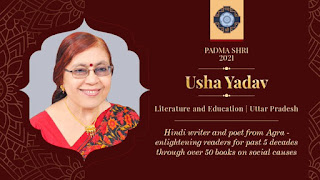Shri Gulfam Ahmed | Art |Uttar Pradesh |Awarded PADMA SHRI | 2021
Music transcends borders and captivates hearts. Going by this maxim, India’s noted rabab exponent Gulfam Ahmad Khan, 61, is a winner all the way, from India to Afghanistan.
Khan, who played the Afghan rabab at Sankatmochan Sangeet Samaroh here late Saturday night and left the audience spellbound, has become India’s ambassador of goodwill of sorts in Afghanistan.
In Afghanistan, he teaches locals the rudiments of playing the lute-shaped musical instrument which is quite akin to the sarod.
Khan, who divides his time between New Delhi and Kabul, has taught 250 Afghan nationals and 50 more are under his tutelage. His skill has earned him enormous respect in Afghanistan where people call him Ustad.
In particular, he wants to popularise the Dhrupadi rabab (Narad veena), an Indian variety of the instrument, across Afghanistan and in other parts of the world.
Khan wishes for Prime Minister Narendra Modi to take the initiative to popularise the Indian rabab.
“Dhrupadi rabab is a completely classical instrument. It produces spiritual tunes. The Afghan rabab is for fast tunes. The Indian rabab needs promotion and preservation. If the centre makes a little effort, it may become a highly popular instrument in Afghanistan,” Khan told HT.
Khan , who is in Varanasi on a four-day tour, will leave for New Delhi on Monday.
Born in Bugrasi, a town in Bulandshahar, he started playing the rabab with his father Ishtiyaque Khan who had mastery over both rabab and sarod. He gave his first performance at the age of nine in Gurudaspur.
After putting in hours of riyaaz (practice), he honed his skills.
A few years later, he performed in Ahmedabad and did not have to look back thereafter.
He took a break for a few years in the late 198os when there were no connoisseurs of the great art. During this period, he played the sarod, only to return to the rabab in the 1990s.
Starting a fresh innings, he gave a few public performances and wrote the popular number ‘Gata jaaye mast kalandar, Allah teri shan, Maula teri shan’, composing the music on the rabab.
The song made him popular across Punjab.
When he visited his daughter and son-in-law in Afghanistan, he played the rabab and impressed the locals there. Many of them insisted on learning to play the rabab from him. He did not refuse.
As his renown reached the Indian embassy in Afghanistan, senior officials invited him to hold classes on the rabab to the Afghan people. Shedding his initial reluctance, he eventually accepted the offer.
He remained in Afghanistan between 2009 and 2014, training many locals. He also learned some local songs.
“Over 250 Afghans learned to play the rabab in my classes. Some of them are professional rabab players. Around 50 Afghans still take tips from me,” he said.
“Performing at the Sankatmochan Hanuman Temple is a spiritual experience. The audience enjoyed my performance. I will keep coming here. Banaras is a great city and its culture is really fabulous,” he told HT.
After putting in hours of riyaaz (practice), he honed his skills.
A few years later, he performed in Ahmedabad and did not have to look back thereafter.
He took a break for a few years in the late 198os when there were no connoisseurs of the great art. During this period, he played the sarod, only to return to the rabab in the 1990s.
Starting a fresh innings, he gave a few public performances and wrote the popular number ‘Gata jaaye mast kalandar, Allah teri shan, Maula teri shan’, composing the music on the rabab.
The song made him popular across Punjab.
When he visited his daughter and son-in-law in Afghanistan, he played the rabab and impressed the locals there. Many of them insisted on learning to play the rabab from him. He did not refuse.
As his renown reached the Indian embassy in Afghanistan, senior officials invited him to hold classes on the rabab to the Afghan people. Shedding his initial reluctance, he eventually accepted the offer.
He remained in Afghanistan between 2009 and 2014, training many locals. He also learned some local songs.
“Over 250 Afghans learned to play the rabab in my classes. Some of them are professional rabab players. Around 50 Afghans still take tips from me,” he said.
“Performing at the Sankatmochan Hanuman Temple is a spiritual experience. The audience enjoyed my performance. I will keep coming here. Banaras is a great city and its culture is really fabulous,” he told HT.



Comments
Post a Comment